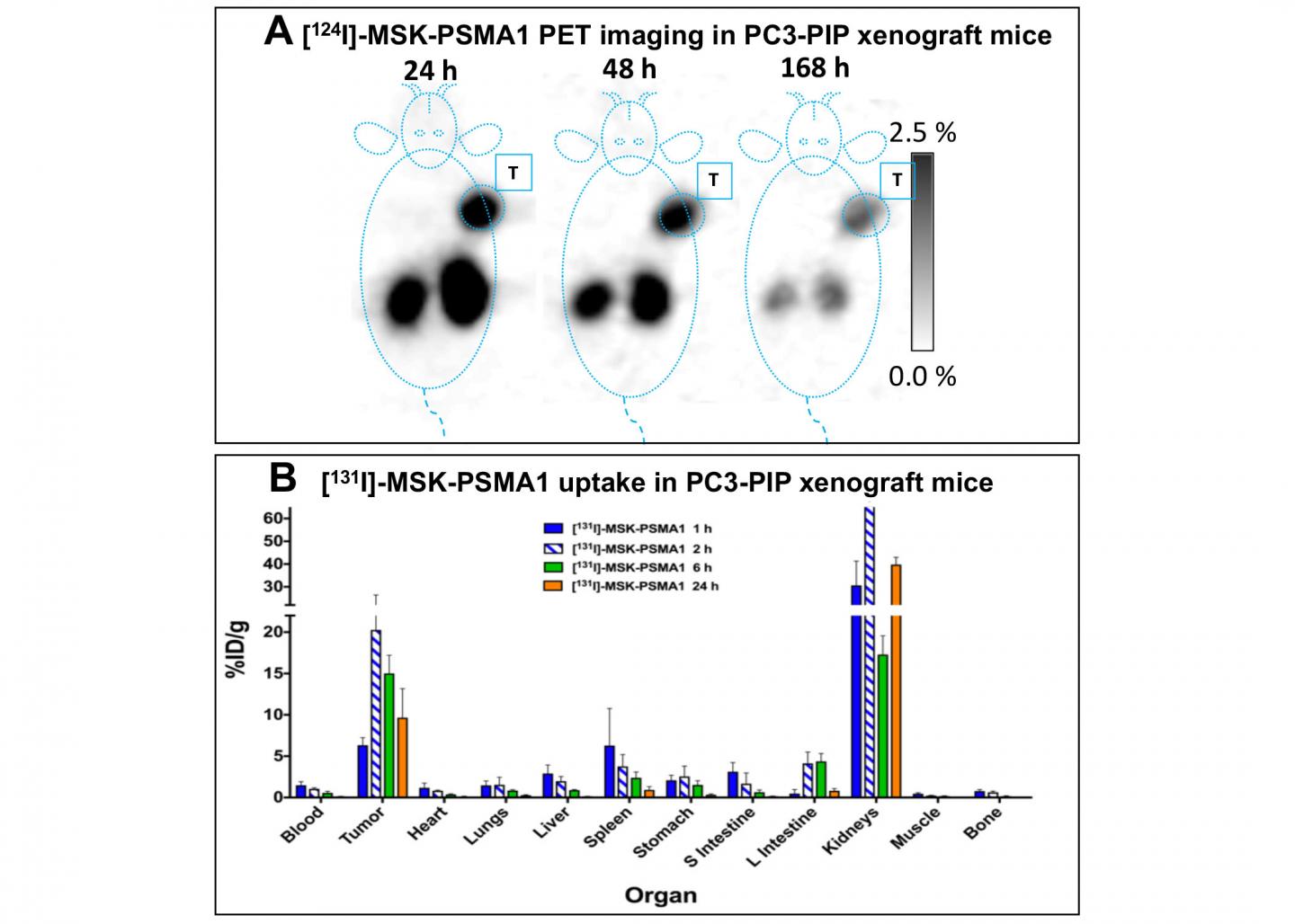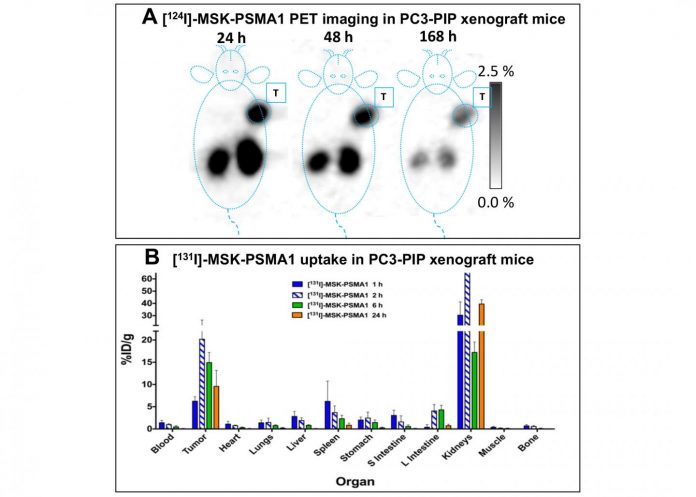
IMAGE: Panel A shows PET images (coronal slices) of 124I-MSK-PSMA1 in mice bearing PC3-PIP xenografts on the right shoulder at 24, 48 and 168 hours after administration, demonstrating accumulation and retention…
view more
Credit: Kalidindi TM, et al., Pillarsetty Lab, MSKCC, New York, NY.
Researchers have developed a new pair of agents that show exceptional effectiveness for precision diagnosis and treatment of prostate cancer in preclinical studies. The agents, which target prostate-specific membrane antigen (PSMA), can be easily and economically synthesized without specialized equipment. This research was presented at the Society of Nuclear Medicine and Molecular Imaging’s 2020 Annual Meeting on July 11-14.
PSMA is highly overexpressed in both primary and metastatic prostate cancer, making it a leading target for the development of radiopharmaceuticals. Iodine has several easily available isotopes with long half-life that can be used for single-photon emission computed tomography (SPECT), positron emission tomography (PET) or therapy. However, currently available radioiodinated PSMA-targeting radiopharmaceuticals require multiple steps for production, which reduces their yield and poses significant challenges for producing therapeutic doses.
To address this issue, researchers at Memorial Sloan Kettering Cancer Center (MSK) in New York, New York, developed the novel radioiodinated PSMA-targeting radiopharmaceutical 124/131I-MSK-PSMA1. “We were motivated by the fact that 131I is widely available, economical, can be used for diagnostic imaging and has demonstrated efficacy as a therapeutic agent. Our goal was to develop a radiopharmaceutical that can be produced very easily in high yields and high purity without requiring specialized equipment,” said Dr. Kishore Pillarsetty, a radiochemist at MSK and senior author on the research. “124/131I-MSK-PSMA1 is the result of this search.”
To demonstrate its efficacy, researchers synthesized 124/131I-MSK-PSMA1 and performed in vitro and in vivo studies. In vitro saturation binding assays were performed in prostate cancer cells, which were later harvested and counted for radioactivity using a gamma counter. In vivo PET imaging and biodistribution studies were performed on mice bearing prostate cancer xenografts.
The study indicates that 124/131I-MSK-PSMA1 can be produced in high yields without generating volatile byproducts, eliminating the need for high-pressure liquid chromatography purification. The in vitro and in vivo studies in prostate cancer cell and tumor xenograft models indicate high specificity, favorable pharmacokinetics and rapid clearance from non-target tissue.
“The exceptional tumor targeting and clearance from non-PSMA-expressing tissues make 124I-MSK-PSMA1 an excellent PET imaging agent and the corresponding 131I-MSK-PSMA1 a highly potent radiotherapeutic agent,” said lead author Teja Muralidar Kalidindi, a senior research technician at MSK . “Because the diagnostic and therapeutic isotopes are chemically identical, we can precisely estimate the dose delivered to the tumor and other organs and personalize the dose to achieve the goals of precision medicine. We believe that 124/131I-MSK-PSMA1 has the potential to become part of the armamentarium available to the nuclear medicine and molecular imaging community for the diagnosis and treatment of metastatic castration-resistant prostate cancer patients.”
Researchers are currently working with nuclear medicine clinicians to translate these findings into the first-in-human clinical trial for 124/131I-MSK-PSMA1. Additionally, the team plans to develop a kit formulation that will facilitate on-demand, onsite production to ensure that the radiopharmaceutical is available to the worldwide research community.
###
Abstract 383. “Novel radioiodinated theranostic agent targeting PSMA for Prostate cancer,” Teja Muralidhar Kalidindi, Sang-gyu Lee, Jason Lewis, Steven Larson and NagaVaraKishore Pillarsetty, Memorial Sloan Kettering Cancer Center, New York, New York. SNMMI’s 67th Annual Meeting, July 11-14, 2020.
All 2020 SNMMI Annual Meeting abstracts can be found online at http://jnm.
About the Society of Nuclear Medicine and Molecular Imaging
The Society of Nuclear Medicine and Molecular Imaging (SNMMI) is an international scientific and medical organization dedicated to advancing nuclear medicine and molecular imaging, vital elements of precision medicine that allow diagnosis and treatment to be tailored to individual patients in order to achieve the best possible outcomes.
SNMMI’s members set the standard for molecular imaging and nuclear medicine practice by creating guidelines, sharing information through journals and meetings and leading advocacy on key issues that affect molecular imaging and therapy research and practice. For more information, visit http://www.
TDnews















